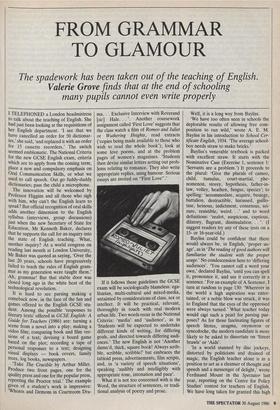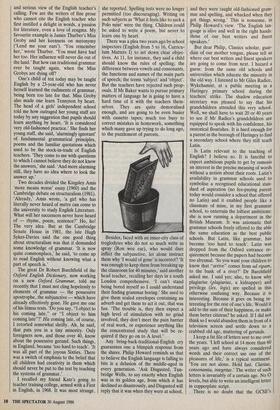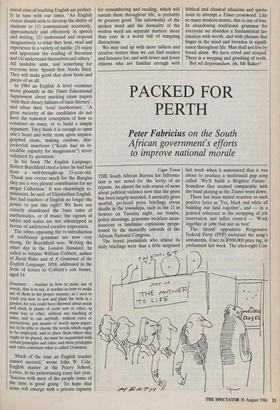FROM GRAMMAR TO GLAMOUR
The spadework has been taken out of the teaching of English.
Valerie Grove finds that at the end of schooling
many pupils cannot even write properly
I TELEPHONED a London headmistress to talk about the teaching of English. She had just been looking at the requisitions of her English department. 'I see that we have cancelled an order for 50 dictionar- ies,' she said, 'and replaced it with an order for 15 cassette recorders.' The switch seemed emblematic. The National Criteria for the new GCSE English exam, criteria which are to apply from the coming term, place a new and compulsory emphasis on Oral Communication Skills, or what we used to call speech. Out go fuddy-duddy dictionaries; pass the child a microphone.
The innovation will be welcomed by Professor Higgins and all those who sigh with him, why can't the English learn to speak? But official recognition of oral skills adds another dimension to the English syllabus (interviews, group discussions) just when the new Secretary of State for Education, Mr Kenneth Baker, declares that he supports the call for an inquiry into the state of English teaching. What, another inquiry? At a world congress on reading last month at London University, Mr Baker was quoted as saying, 'Over the last 20 years, schools have progressively failed to teach the rules of English gram- mar as my generation were taught them.' Ah, grammar! But that stable door was closed long ago in the white heat of the technological revolution.
It is hard to see parsing making a comeback now, in the face of the fun and games offered to the English GCSE stu- dent. Among the possible 'responses to literary texts' offered in GCSE English: A Guide for Teachers (1986) are: turning a scene from a novel into a play; making a video film; comparing book and film ver- sions of a text; devising a board game based on the plot; recording a tape of personal responses to a text; designing visual displays — book covers, family trees, log books, newspapers. `Take The Crucible by Arthur Miller. Produce two front pages, one for the quality press and one for the popular press, reporting the Proctor trial.' The example given of a student's work is impressive: `Whores and Demons in Courtroom Dra- ma. . . Exclusive Interview with Reverand [sic] Hale. . . '. Another coursework assignment called 'First Love' suggests that the class watch a film of Romeo and Juliet or Wuthering Heights, read extracts (`copies being made available to those who wish to read the whole book'); look at some love poems, and at the problem pages of women's magazines. 'Students then devise similar letters setting out prob- lems relating to romance. They also write appropriate replies, using humour. Serious essays are invited on "First Love".'
If it follows these guidelines the GCSE exam will be sociologically blameless: ega- litarian, multi-cultural and mixed-media, untainted by considerations of class, sex or intellect. It will be practical, relevant, thoroughly in touch with real modern urban life. Two words recur in the National Criteria: 'media' and 'audience', as in `Students will be expected to undertake different kinds of writing, for differing goals, and directed towards differing audi- ences.' The new English is not 'Another damn'd, thick, square book! Always scrib- ble, scribble, scribble!' but embraces the tabloid press, advertisements, film scripts, and, in 'a variety of speech situations', speaking 'audibly and intelligibly with appropriate tone, intonation and pace'. What it is not too concerned with is the Word, the structure of sentences, or tradi- tional analysis of poetry and prose. Well, it is a long way from Bayliss.
`We have too often seen in schools the deplorable results of allowing free com- position to run wild,' wrote A. E. M. Bayliss in his introduction to School Cer- tificate English, 1934. 'The average school- boy needs straw to make bricks.'
Bayliss's venerable textbook is packed with excellent straw. It starts with the Nominative Case (Exercise 1, sentence 1: `Servants are a problem.') It proceeds to the plural: 'Give the plurals of cameo, child, tumulus, court-martial, phe- nomenon, storey, hypothesis, father-in- law, volley, heathen, fungus, species'; to spelling: 'accommodate, acquire, besiege, battalion, destructible, harassed, guillo- tine, heinous, indictment, consensus, sei- zure, resistible, weird. . .' and to word definitions: 'zealot, auspicious, captious, dilatory, flagrant, dissimulation. . . (I suggest readers try any of these tests on a 15- or 16-year-old.) Bayliss could be confident that there would always be, in English, 'proper us- age', as in 'The reading of good authors will familiarise the student with the proper usage.' No condescension here to 'differing audiences'. 'You cannot call a word your own,' declared Bayliss, 'until you can spell it, pronounce it, and use it correctly in a sentence.' For an example of A Sentence, I turn at random to page 130: 'Wherever in the world a high aspiration was enter- tained, or a noble blow was struck, it was to England that the eyes of the oppressed were always turned.' What teacher today would• capt such a pearl for parsing pur- poses? As for those fascinating figures of speech litotes, zeugma, oxymoron or synecdoche, the modern candidate is more likely to be asked to dissertate on 'Street brawls' or 'Aids'.
`In a world stunned by disc jockeys, distorted by politicians and drained of magic, the English teacher alone is in a position to act as a cleanser of thought and speech and a messenger of delight,' wrote Ferdinand Mount in the Spectator last year, reporting on the Centre for Policy Studies' contest for teachers of English. We have long taken for granted this high and serious view of the English teacher's calling. Few are the writers of fine prose who cannot cite the English teacher who first instilled a delight in words, a passion for literature, even a love of zeugma. My favourite example is James Thurber's Miss Groby and her keenness on metonymy (Tend me your ears'). 'You remember her,' wrote Thurber. 'You must have had her too. Her influence will never die out of the land.' But how can traditional grammar ever be taught again, when the Miss Grobys are dying off?
One's child of ten today may be taught English by a 23-year-old who has never herself learned the rudiments of grammar, being born too late for that. Miss Groby also made one learn Tennyson by heart. The head of a girls' independent school told me how outraged her young staff are today by any suggestion that pupils should learn anything by heart. 'It is considered very old-fashioned practice.' She finds her young staff, she said, 'alarmingly ignorant' of fundamental grammatical principles, poems and the familiar quotations which used to be the stock-in-trade of English teachers. 'They come to me with questions to which I cannot believe they do not know the answers,' she said. 'And more alarming still, they have no idea where to look the answer up.'
Two decades divided the Kingsley Amis `more means worse' essay (1960) and the Cambridge debate on structuralism (1981). `Already,' Amis wrote, 'a girl who has literally never heard of metre can come to the university to study English Literature. What will her successors never have heard of — rhyme, poem, sentence?' Ho, ho! The very idea. But at the Cambridge Senate House in 1981, the late Hugh Sykes-Davies said the one good thing about structuralism was that it demanded some knowledge of grammar. 'It is now quite commonplace,' he said, `to come up to read English without knowing what a part of speech is.'
The great Dr Robert Burchfield of the Oxford English Dictionary, now working on a new Oxford Grammar, told me recently that I must not cling hopelessly to elements of grammar — the possessive apostrophe, the subjunctive — which have already effectively gone. He gave me one of his litmus tests. 'Do you say, "I object to his coming late," or "I object to him coming late"?' His coming late, of course, I retorted somewhat shrilly. Ah, he said, that puts you in a tiny minority. Only foreigners now, and those over 40, know about the possessive gerund. Such things, in England, became 'too hard to teach'. 'It was all part of the joyous Sixties. There was a switch of emphasis to the belief that all children had creativity in them which should never be put to the test by teaching the systems of grammar.'
I recalled my friend Kate's going to teacher training college, armed with a First in English, in 1968. It was most strange, she reported. Spelling tests were no longer permitted (too discouraging). Writing on such subjects as 'What it feels like to suck a Polo mint' were the thing. Children could be asked to write a poem, but never to learn one by heart.
There was a plea two years ago by school inspectors (English from 5 to 16, Curricu- lum Matters I) to set down clear objec- tives. At 11, for instance, they said a child should know the rules of spelling; the difference between vowels and consonants, the functions and names of the main parts of speech; the terms 'subject' and 'object'. But the teachers have rejected such prop- osals. If Mr Baker wants to pursue primary matters of language he is going to have a hard time of it with the teachers them- selves. They are quite demoralised enough, and are going to be even busier with cassette tapes; much too busy to correct mistakes in homework, something which many gave up trying to do long ago, to the puzzlement of parents.
Besides, faced with an inner-city class of troglodytes who do not so much write as spray (Ron woz ear), who would dare inflict the subjunctive, let alone instruct them why would of gone' is incorrect? 'It was enough to keep them from breaking up the classroom for 40 minutes,' said another head teacher, recalling her days in a south London comprehensive. 'I can't stand being bored myself so I could understand their finding grammar boring.' She used to give them sealed envelopes containing an adverb and get them to act it out; that was fun. 'The trouble is, they then expect a high level of stimulation with no grind involved, they don't meet the pain barrier of real work, or experience anything like the concentrated study that will be re- quired if they go on to A level.'
Any bring-back-traditional-English cry guarantees one a blimpish response from the shires. Philip Howard reminds us that to believe the English language is falling to bits is a delusion of the middle-aged in every generation. 'Ask Disgusted, Tun- bridge Wells, to say exactly when English was in its golden age, from which it has declined so disastrously, and Disgusted will reply that it was when they were at school, and they were taught old-fashioned gram- mar and spelling, and whacked when they got things wrong.' This is nonsense, in Philip Howard's view. 'The English lan- guage is alive and well in the right hands: those of our best writers and finest speakers.'
But dear Philip, Classics scholar, guar- dian of our mother tongue, please tell us where our best writers and finest speakers are going to come from next. I hazard a guess: from the same old schools and universities which educate the minority in the old way. I listened to Mr Giles Radice, Wykehamist, at a public meeting in a Haringey primary school during the teachers' strike. The shadow education secretary was pleased to say that his grandchildren attended this very school. Well, we shall have to wait 20 or 40 years to see if Mr Radice's grandchildren are equipped to speak with his confidence, his oratorical flourishes. It is hard enough for a parent in the borough of Haringey to find a secondary school where they still teach Latin.
Is Latin relevant to the teaching of English? I believe so. It is fanciful to expect ambitious pupils to get by osmosis an interest in the precise meaning of words without a notion about their roots. Latin's availability in grammar schools used to symbolise a recognised educational stan- dard of aspiration (no fee-paying parent today would consider a school that offered no Latin) and it enabled people like a classmate of mine, in my first grammar school, to entertain the loftiest ambitions: she is now running a department in the British Museum. It was axiomatic that grammar schools freely offered to the able the same education as the best public schools. But Latin, like grammar, has become 'too hard to teach'. Latin was dropped from the Oxford entrance re- quirement because the papers had become too abysmal. `So you want your children to know that "arrive" comes from ad ripam, to the bank of a river?' Dr Burchfield asked me. I said yes; also, to know why plagiarise (plagiaries, a kidnapper) and privilege (lex, legis) are spelled in this otherwise confusing way. Because it is interesting. Because it goes on being in- teresting for the rest of one's life. Would it add to the sum of their happiness, or make them better citizens? he asked. If I did not think so I would abandon them in front of a television screen and settle down to a crabbed old age, muttering of gerunds.
I keep a fat file of letters sent to me over the years. 'I left school at 14 more than 60 years ago and have always considered words and their correct use one of the pleasures of life,' is a typical sentiment. `You are not alone. Hold fast. Claritas, consonantia, integritas.' The writer of such letters is invariably of a certain age. No 0 levels, but able to write an intelligent letter in copperplate script. There is no doubt that the GCSE's stated aims of teaching English are perfect- ly in tune with our times. 'An English course should seek to develop the ability of students to (1) communicate accurately, approximately and effectively in speech and writing; (2) understand and respond imaginatively to what they hear, read and experience in a variety of media; (3) enjoy and appreciate the reading of literature and (4) understand themselves and others.' All laudable aims, and something for everyone here. Speech first, books third. They will make good chat show hosts and guests of us all.
In 1984 an English A level examiner wrote gloomily in the Times Educational Supplement about marking exam papers `with their dreary failures of basic literacy', and often their 'total incoherence'. 'A great majority of the candidates do not have the remotest conception of how to construct an essay, or to build a simple argument. They think it is enough to open one's heart and write ream upon unpara- graphed ream, making random, disc- jockeyish assertions ("Keats had an in- credible capacity for imagination") never validated by quotation.' In his book The English Language, Robert Burchfield cited a letter he had had from a well-brought-up 15-year-old. `Thank you everso much for the Bangles they are a very plesent contribution for my megar Collection.' It was charmingly re- miniscent, he said, of Elizabethan English. But had teachers of English no longer the power to put this right? We have not entirely abandoned the basic rules of mathematics, or of music; the rigours of tables and scales are not sidestepped in favour of unfettered creative expression.
The tribes opposing the re-introduction of traditional grammar are now very strong, Dr Burchfield says. Writing the other day in the London Standard, he called as witness William Cobbett, author of Rural Rides and of A Grammar of the English Language, 1818, addressed in the form of letters to Cobbett's son James, aged 14: Grammar. . . teaches us how to make use of words; that is to say, it teaches us how to make use of them in the proper manner, as I used to teach you how to sow and plant the beds in a garden; for you could have throwed about seeds and stuck in plants of some sort or other, in some way or other, without any teaching of mine; and so can anybody, without rules or Instructions, put masses of words upon paper; but to be able to choose the words which ought to be employed, and to place them where they ought to be placed, we must be acquainted with certain principles and rules; and these principles and rules constitute what is called Grammar.
`Much of the time an English teacher cannot succeed,' wrote John W. Cole, English master at the Priory School, Lewes, in his prizewinning essay last year. `Success with most of the people some of the time is good going.' To hope that some will emerge with a private capacity for remembering and reading, which will sustain them throughout life, is probably its greatest good. The informality of the spoken word and the formality of the written word are separate matters: more than ever in a world full of tempting distractions.
We may end up with more talkers and creative writers than we can find readers and listeners for; and with fewer and fewer citizens who are familiar enough with biblical and classical allusions and quota- tions to attempt a Times crossword. Like so many modern stories, this is one of loss. In abandoning traditional grammar for everyone we abandon a fundamental fas- cination with words, and with phrases that linger in the mind and broaden in signifi- cance throughout life. Man shall not live by bread alone. We have erred and strayed. There is a weeping and gnashing of teeth.
But nil desperandum, eh, Mr Baker?










































 Previous page
Previous page